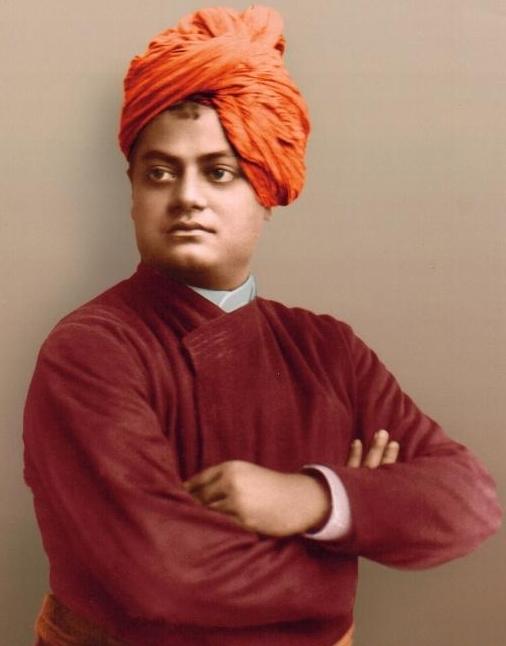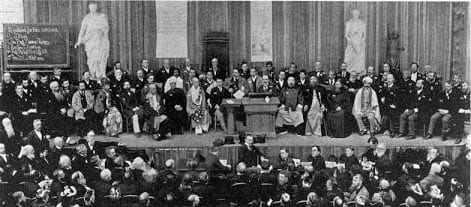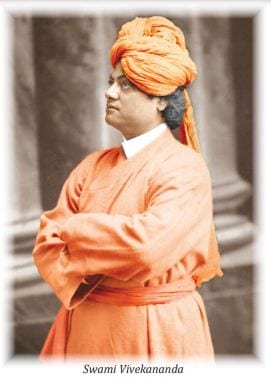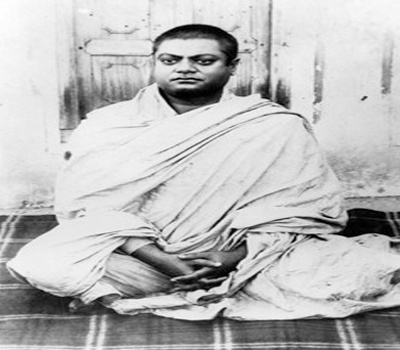It is not generally known, but there are at least two versions of Swami Vivekananda’s famous speech titled ‘Response to Welcome.’ That was the first speech he gave at the World’s Parliament of Religions in Chicago, on 11 September 1893. There are a short version and a long version.
The short version is the standard, canonical version. It is found in The Complete Works of Swami Vivekananda (hereafter, CW), Volume 1, pp. 3-4, and it is 472 words long.
The long version, which is less known, is also in the CW, but in Volume 9, pp. 429-430. It is 554 words long—82 words longer than the short version. Published in a section titled ‘American Newspaper Reports,’ it is described as an ‘Editorial synthesis of four Chicago newspaper reports from: Herald, Inter Ocean, Tribune, and Record, ca. September 11, 1893.’ As Volume 9 notes (p. 429), it was compiled by the late Marie Louise Burke (Sister Gargi), and first appeared in her monumental work, Swami Vivekananda in the West: New Discoveries, Volume 1, pp.83-84.
The two versions combined
The interesting thing about the long version is the ways in which it differs from the short one. Below is a conflation of the two. The text in black print is common to both. The text in red italics appears only in the long version. Where there is a difference in wording, I give both, separated by a slash bar (/). The wording in the short version comes first, then the slashbar, then the wording in the long version, in red italics:
Sisters and brothers of America,
It fills my heart with joy unspeakable to rise in response to the warm and cordial welcome which you have given us. / to the grand words of welcome given to us by you. I thank you in the name of the most ancient order of monks in the world. / the most ancient order of monks the world has ever seen, of which Gautama was only a member. I thank you in the name of the mother / Mother of religions, of which Buddhism and Jainism are but branches; and I thank you, finally, in the name of the millions and millions of Hindu / Hindoo people of all classes / castes and sects.
My thanks, also, to some of the speakers on the /this platform, who, referring to the delegates from the Orient, [the long version omits ‘referring to the delegates from the Orient’] have told you that these men from far-off nations may well claim the honour of bearing to different lands the idea of toleration. / will bear to the different lands the idea of toleration which they may see here. My thanks to them for this idea.

I am proud to belong to a religion which has taught the world both tolerance and universal acceptance. We believe not only in universal toleration, / tolerance, but we accept all religions as / to be true. I am proud to tell you that I belong to a religion in whose sacred language, the Sanskrit, the word exclusion is untranslatable. (Applause.) I am proud to belong to a nation which has sheltered the persecuted and the refugees of all religions and all nations of the earth. I am proud to tell you that we have gathered in our bosom the purest remnant of the Israelites, who / a remnant of which came to Southern / southern India and took refuge with us in the very year / years in which their holy temple was shattered to pieces by Roman tyranny. I am proud to belong to the religion which has sheltered and is still fostering the remnant of the grand Zoroastrian nation.
I will quote to you, brethren, / brothers, a few lines from a hymn which every Hindoo child repeats every day. I feel that the very spirit of this hymn, which I remember to have repeated from my earliest boyhood, which is every day repeated by millions of human beings: / by millions and millions of men in India, has at last come to be realized. ‘As the different streams, having their sources in different places, all mingle their water in the sea, so, O Lord, / O Lord, so the different paths which men take through different tendencies, various though they appear, crooked or straight, all lead to Thee.’ The present convention, which is one of the most august assemblies ever held, is in itself a vindication, / an indication, a declaration to the world of the wonderful doctrine preached in the Gita [the long version italicises ‘Gita’]: ‘Whosoever comes to Me, through whatsoever form, I reach him; all men [the long version omits ‘men’] are struggling through paths which in the end always lead to Me.’ Sectarianism, bigotry, and its horrible descendant, fanaticism, have long possessed / have possessed long this beautiful earth. They have / It has filled the earth with violence, drenched it often and often with human blood, / with human gore, destroyed civilisation / civilization and sent whole nations to / into despair. Had it not been for these horrible demons, human society would be far more advanced than it is now. [The long version omits this last sentence.] But their time is come; / But its time has come; and I fervently hope / believe that the bell that tolled this morning in honour of this convention / in honor of the representatives of the different religions of the earth, in this parliament assembled, may be the deathknell of all fanaticism, of all persecutions / is the death-knell to all fanaticism (applause), that it is the death-knell to all persecution with the sword or with the pen, and of all uncharitable feelings between persons / brethren wending their way to the same goal. / to the same goal, but through different ways.
Analysis
If Sister Gargi synthesised the long version from four Chicago newspaper reports, where does the short version come from? Evidently it is a slightly edited variation of the version published in John Henry Barrows’ magisterial history of the parliament, The World’s Parliament of Religions, Volume 1, pp. 101-102, published in Chicago in 1893, the same year the parliament was held. Sister Gargi suggested this in New Discoveries, Volume 1, p. 82.
It seems likely that the long version was a more accurate rendering of Swamiji’s speech than the short one. It sounds closer to spoken English. In fact, the short version looks very much like an edited version of the long one. It is smoother; some of the rough edges have been sandpapered away. Nonessential phrases and clauses have been deleted. Claims that might strike a discordant note in the harmony of religions by offending the Buddhists and the Jains (‘of which Gautama was only a member,’ ‘of which Jainism and Buddhism are but branches’) have been dropped. The sentence containing the claim ‘a religion in whose sacred language, the Sanskrit, the word exclusion is untranslatable’ has been deleted. Extraneous words like finally and always have been omitted. Lengthy phrases have been condensed: ‘millions and millions of men in India’ has been downsized to ‘millions of human beings’; ‘the representatives of the different religions of the earth, in this parliament assembled’ has been whittled away to ‘this convention.’ Stylistically, the short version is superior.
The English usage provides further evidence that the long version is truer to the original. First, we have the phrase ‘given to us by you.’ Indian English is fond of the passive voice. Swamiji was an Indian, so he would have been less likely to say ‘which you have given us.’ That construction is more idiomatic in American English, and is likely to have been substituted by an American editor.
Second, Swamiji was more likely to have used the word castes, which is specific to Indian culture, than the more general word classes. Third, the long version, recorded by American reporters, uses American spelling throughout (honor, civilization, realized), whereas the short version, probably edited in India, uses British spelling (honour, civilisation).
There is a question of whether Swamiji referred to human blood (short version) or human gore (long). I suspect the latter, because it’s more colourful. Swamiji was never shy about using colourful language. Prim and proper Victorian minds would naturally shy away from the goriness of gore and want to substitute the more sanitised word blood.
The short version ends with a bang: the hope that the bell that had tolled that morning would sound ‘the death-knell…of all uncharitable feelings between persons wending their way to the same goal.’ The long version ends (with apologies to T.S. Eliot), not with a bang, but a whimper: it trails off with the debilitating qualifier, ‘but through different ways.’ But it compensates for this shortcoming by replacing the vague and general word persons with the warmer and more inclusive word brethren.
Conclusion
So far as we know, Swamiji had to compose the speech in his head, while sitting on the stage waiting to be called on. We don’t know how much advance notice he had. We do know that he had declined an invitation to speak at the morning session, a few hours earlier. The short version is a masterpiece of rhetoric, and might easily be taught as a model for students to emulate in both speaking and writing. The longer version is also very good. As it was delivered with very little time for preparation, given the conditions under which Swamiji had to compose it, in terms of content, organisation, and eloquence its high quality is almost miraculous.
Both versions serve three functions: they respond gratefully to the warm welcome Swamiji has received; they summarise concisely and eloquently the centuries-long Hindu tradition of accepting other faiths and welcoming their believers; and they end with an appeal for an end to intolerance. Whichever version comes closer to the original, the fact that Swamiji composed it in his head, without any books to refer to and without even being able to write it down, shows once again the matchless quality of that marvelous brain.
Source : Vedanta Kesari, January, 2019






Leave A Comment